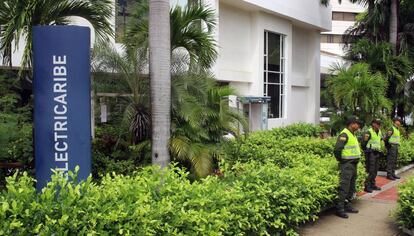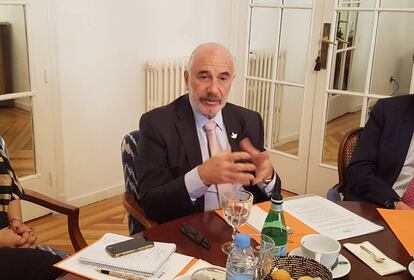Spain calls for “negotiated solution” over Electricaribe liquidation
Foreign minister backs Gas Natural Fenosa in its dispute with the Colombian government
Madrid supports a “negotiated solution” to the dispute between Spain’s energy utility Gas Natural Fenosa and the Colombian government, after the latter on Tuesday liquidated Electricaribe, the electricity distributor that supplies electricity to almost 2.5 million Colombians.

On Thursday, the Spanish government expressed regret over the Colombian decision and said it would support Gas Natural if it decided to pursue legal action.
Speaking during a visit to Mexico, Spain’s foreign minister, Alfonso Dastis, pointed out that if Gas Natural Fenosa cannot reach an agreement with Colombia, “there are juridical mechanisms,” referring to the International Centre for Settlement of Investment Disputes (ICSID).
Sources at Gas Natural Fenosa have told EL PAÍS they will file a complaint within 15 days with the World Bank’s ICSID agency over Colombia’s decision to liquidate Electricaribe.
In November, the Colombian government took control of the company, which is 85.38% owned by Spanish energy utility Gas Natural Fenosa, citing risks from lack of payment and quality of service.
High-level meetings
The Colombian government has launched a diplomatic offensive in a bid to calm Spanish investors in the South American country. There have reportedly been high-level meetings between senior government officials and the heads of Spanish companies operating in Colombia this week to emphasize that their assets are protected by law and that the government’s intervention in Electricaribe has been an exception and justified, say diplomatic sources.

The message being sent out by the government of President Juan Manuel Santos is that the takeover of Electricaribe is not an “expropriation” and that the Colombian government “is not looking, nor is it empowered” to, hold onto the company, and that it “will always protect private investment.”
More than 400 Spanish companies are present in Colombia, among them Telefónica, Sacyr, Repsol, Mapfre, and Aena.
Ongoing trouble
Electricaribe, which serves the Colombian Caribbean provinces of Atlántico, Bolívar, César, Cordoba, La Guajira, Magdalena and Sucre, hit problems early last year, with customers complaining about frequent power outages.
Gas Natural Fenosa, which bought a controlling stake in Electricaribe in 2000, has been accused of failing to invest in infrastructure and had stopped paying electricity suppliers. The Colombian government intervened in November due to a cash crunch at Electricaribe caused by a high number of unpaid bills and widespread consumer fraud. Gas Natural Fenosa says the company has accumulated unpaid bills of €1.26 billion from some 1.5 million of its customers.
Madrid said it would support Gas Natural if it decided to pursue legal action
Dastis defended Gas Natural Fenosa, saying that it had “worked positively and was prepared to adapt” to new conditions.
Spanish diplomatic sources say that two main points of disagreement between Gas Natural and the Colombian authorities had been overcome: payment of Electricaribe bills run up by public bodies and fighting consumer fraud.
But so far there has been no agreement on new tariffs, and above all, on them being maintained long enough to be able to amortize the investments Gas Natural Fenosa was prepared to implement to ensure supplies. Without these conditions, say diplomatic sources, the viability of Electricaribe could not be guaranteed.
English version by Nick Lyne.
Tu suscripción se está usando en otro dispositivo
¿Quieres añadir otro usuario a tu suscripción?
Si continúas leyendo en este dispositivo, no se podrá leer en el otro.
FlechaTu suscripción se está usando en otro dispositivo y solo puedes acceder a EL PAÍS desde un dispositivo a la vez.
Si quieres compartir tu cuenta, cambia tu suscripción a la modalidad Premium, así podrás añadir otro usuario. Cada uno accederá con su propia cuenta de email, lo que os permitirá personalizar vuestra experiencia en EL PAÍS.
¿Tienes una suscripción de empresa? Accede aquí para contratar más cuentas.
En el caso de no saber quién está usando tu cuenta, te recomendamos cambiar tu contraseña aquí.
Si decides continuar compartiendo tu cuenta, este mensaje se mostrará en tu dispositivo y en el de la otra persona que está usando tu cuenta de forma indefinida, afectando a tu experiencia de lectura. Puedes consultar aquí los términos y condiciones de la suscripción digital.









































